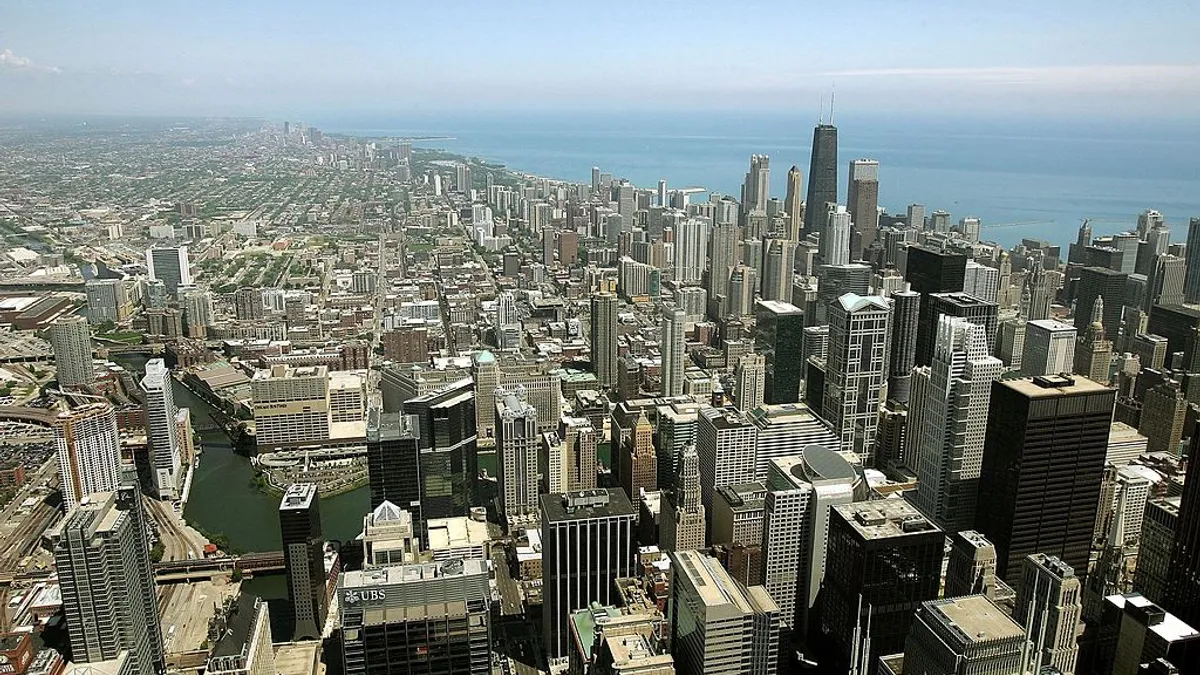Dive Brief:
- Chicago's newly created Building Decarbonization Working Group will work to devise an equitable path for reducing building emissions to meet the city's climate goals, which include an aim to power all buildings with renewable energy by 2035.
-
The working group, announced last week, will establish a comprehensive framework for guiding the city's equitable implementation of a building decarbonization strategy. The 55 individuals on the working group hail from private businesses, nonprofits, organizations and community groups. "The equity lens is really important to us for this project: really understanding the opportunity to not only reduce greenhouse gas emissions, but also to ensure that we are taking care and prioritizing the health of people in the buildings," said Chicago Chief Sustainability Officer Angela Tovar.
- The city partnered with the Natural Resources Defense Council and Elevate Energy to research 12 other North American cities' decarbonization policies and best practices, which the partners presented to the working group to guide their decision-making. The working group likely will put forth its recommendations for implementing a decarbonization strategy by this fall, Tovar said.
Dive Insight:
Buildings comprise an estimated 70% of Chicago's greenhouse gas emissions, "which presents an important opportunity to invest in our existing and new building stock to drive equitable and green economic solutions right here at home," Mayor Lori Lightfoot said in a statement.
The city held focus groups to gather information before launching the initiative, selecting stakeholders from a variety of backgrounds and sectors to ensure a diverse group of voices contributes to the forthcoming policies, rather than simply engaging developers or the technical community. Ensuring adequate community engagement and representation for a concept as technical as decarbonization is a main challenge, Tovar said.
"We have really tried to think about how we have that conversation in a way that brings all types of folks to the table — folks who may not use the technical language but very much understand what the value is of onsite renewables or electrification or cost savings or energy efficiency... and folks who are deeply committed to workforce development and community wealth building," she said.
A key impetus for creating the working group is the city's acknowledgement of its historical role in contributing to disparities among different portions of the population.
"The city has had an active role in outcomes for things that have led to things like segregation or disparities in terms of quality of life," Tovar said. She notes that specific people at the table didn't necessarily create the disparities, but rather the city's systems as a whole over time — the same type of systemic inequities that are visible in cities across the country. "This [decarbonization] conversation has to prioritize and acknowledge that there are people that have been left out of this conversation. There is work we need to do to overcome some of those disparities," Tovar said.
The city is deliberately examining "how we can ensure that we use policy to correct where policy has created some harm," said Kyra Woods, climate policy advisor for the city of Chicago.
Equity best practices are among the key elements the city of Chicago, NRDC and Elevate Energy examined while researching 12 other U.S. and Canadian cities' decarbonization strategies. They researched whether cities simply view equity as community engagement or if it is more extensive to undo historic systemic damages.
Decarbonization strategy financing, including through green banking, and the ability to sustain it long term is another area the partners researched. Funding is a frequent roadblock for climate-related programs in cities, especially in light of the additional economic obstacles the pandemic caused.
Partners also looked into best practices for codes, electrification policies and building performance standards in cities such as Boston, Denver, New York and Seattle.
Chicago has made other efforts in recent years to reduce buildings' emissions and improve energy efficiency. It launched an initiative to rate large buildings' energy efficiency and make the information public with placards, showing each building's performance on a four-star scale. The ratings are based on the reports that buildings already were required to submit annually to comply with the Chicago Energy Benchmarking Ordinance, passed in 2013. Chicago achieved LEED for Cities platinum certification in 2018, becoming one of the first U.S. cities to reach that status.












